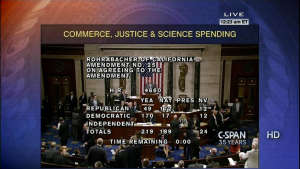Repost of Marijuana Law, Policy & Reform – A Member of the Law Professor Blogs Network
By Alex Kreit
Between grading exams and traveling last weekend, I haven’t had the chance to post since last week. Though I’m still playing catch-up on some items at work, I could not resist writing something up on last night’s big marijuana law news: the House of Representatives passed an appropriations amendment that would ban the DOJ from spending money to interfere with state medical marijuana laws.
The vote is a true political game changer. A majority of House members are now on record in opposition to federal interference with state medical marijuana laws. As Tom Angell of Marijuana Majority put it in the HuffPo article linked above: “This historic vote shows just how quickly marijuana reform has become a mainstream issue.”
Whether the amendment will take effect remains to be seen. The Senate needs to pass its own criminal justice appropriations bill and then the two will need to be reconciled.
If that happens, what exactly would the amendment do?
The full text is here:
Offered By: Mr. Rohrabacher
Amendment No. 25: At the end of the bill (before the short title), insert the following:
Sec. __. None of the funds made available in this Act to the Department of Justice may be used, with respect to the States of Alabama, Alaska, Arizona, California, Colorado, Connecticut, Delaware, District of Columbia, Florida, Hawaii, Illinois, Iowa, Kentucky, Maine, Maryland, Massachusetts, Michigan, Minnesota, Mississippi, Missouri, Montana, Nevada, New Hampshire, New Jersey, New Mexico, Oregon, Rhode Island, South Carolina, Tennessee, Utah, Vermont, Washington, and Wisconsin, to prevent such States from implementing their own State laws that authorize the use, distribution, possession, or cultivation of medical marijuana.
Legally, I’m not sure how much (if any) protection the amendment would actually provide. Putting aside the question of how to ensure compliance with the restriction, the measure only stops the DOJ from using funds to “prevent” states from “implementing their own” medical marijuana laws. It’s far from clear that medical marijuana raids and prosecutions would be covered by this language. After all, prosecuting a medical marijuana dispensary operator in San Diego doesn’t mean that California has been directly prevented from implementing any of its state laws.
But, in this case, I think getting lost in the legal language would be to miss the true impact of this development. The amendment is not meant to change federal drug laws. It is a signal (and a strong one) to the DEA and DOJ that Congress is unhappy about federal interference with state medical marijuana laws.
As this recent article about corporate regulation discusses, “in a divided government where few bills are signed into law, the real action is the tug of war between Congress and the agencies that write rules and implement laws.” That observation doesn’t exactly track this situation. But I think the broader point applies.
If this amendment survives the Senate and takes effect, federal prosecutors and DEA operatives will need to think long and hard before they bring another medical marijuana defendant into court or conduct another raid.
Regardless of the technical language, I suspect the forces in Congress behind the amendment will not be very happy if the DOJ violates its spirit And that means risking funding for the next year, getting yelled at in a Congressional hearing, etc. Perhaps most of all, ignoring this signal would risk elevating the dispute to the point where Congress decides a spending restriction isn’t enough and begins to more seriously explore the possibility of changing federal drug laws. (Not to mention that the vote provides a great deal political cover–to the extent the Obama administration thinks it needs cover–for taking a hands-off approach when it comes to state medical marijuana laws.)
All this is to say that while the amendment might not necessarily provide a lot of legal protection if a medical marijuana defendant does end up in federal court, I think it would provide a great deal of practical insurance against that sort of thing continuing to happen.
And, even if the amendment dies in the Senate, the fact that it passed the House is significant in its own right–both politically and as a warning signal to the DOJ.
Two other notes: First, this wasn’t the only marijuana reform amendment to pass the House. They also approved two amendments to restrict the use of funds to interfere with state Hemp research programs.
Last but not leas, I can’t keep myself from congratulating the staff at Americans for Safe Access (on whose Board I serve) for all of their work to help make this happen. To be sure, something like this doesn’t happen without a number of different groups involved. But ASA is the one organization dedicated to medical marijuana issues exclusively–groups like the Marijuana Policy Project focus on marijuana issues more broadly–and the vote is a huge win for ASA’s constituency and its staff. ASA’s fantastic Executive Director, Steph Sherer, had this piece on HuffPo on the need for the amendment Wednesday. Though the amendment has now passed, her article is still very much worth a read.







